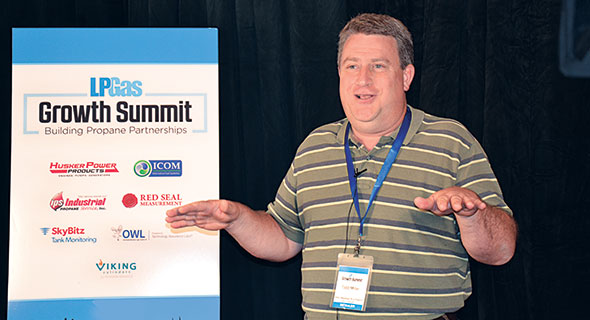Propane gallon growth comes in many forms
Gordon Cunningham worked in the propane industry with his father for a number of years in Arkansas, joining Georgia Gas Distributors this summer as director of marketing and sales.
Cunningham and his father sold their company, Cunningham Butane Gas Co./Cunningham Propane, in 2015. Like a number of retail propane companies, the Cunninghams experienced lost gallon sales over the years. They sought opportunities to replace lost gallons by investing in propane irrigation technologies.
The gallons returned over time, but not without putting forth an extraordinary effort.
“I went through some really tough times at the very beginning, but you have to rally and stay focused,” says Cunningham, whose current company is located in Sandy Springs, Georgia. “It will eventually come together.”
Cunningham had two particularly “stale” years when he felt like he had wasted time exploring growth opportunities. But the fruits of his labor eventually came in the form of irrigation-related sales.
“I really planted a lot of seeds those two years,” he says. “I went out and hustled, put a plan together, went back to them and was persistent. One [customer] finally bought in, and after that it was dominoes. The stars probably aligned for me in my area, but if you work hard enough with a strategy you can do a lot with what’s out there.”
To Cunningham, survival in the propane industry means pursuing new market opportunities.
“There’s no way around it,” he says. “I’ve been saying this for nearly 10 years: It’s important you explore your area to see what you can market in the industry, whether it’s [propane] autogas, irrigation or dryers. Whatever is available in your area, you need to focus on that and strengthen that. Come up with a marketing plan.”
Realize that new sales won’t come overnight, though.
“You’re going to have some stale years because you are planting seeds,” Cunningham says. “Everyone knows autogas is a good thing. It’s developing and getting better every year.”
Differentiation is growth
Todd Miller, manager of finance and administration at White Mountain Oil & Propane in North Conway, New Hampshire, also sees significant value in some of the emerging propane markets. But Miller is interested in opportunities that can differentiate his company from competitors, even if the opportunity isn’t directly tied to gallon growth.
“We live in the Mount Washington Valley in northern New Hampshire,” Miller says. “It’s an area that has a huge population of second-home owners, so half of our client base is out-of-state homeowners. Providing a service through technologies like electronic delivery tickets or having a customer portal where customers can log on to see what’s going on with their account is very important for out-of-state homeowners. We’re trying to figure out all of the ways we can utilize technology to keep that close touch.”
Products such as composite cylinders, which can differentiate White Mountain Oil & Propane’s offerings, are also attractive, Miller says.
“People hate going down to the fill station,” he says. “I would love to be able to offer customers bottle gas delivery, and a [composite] cylinder would be perfect for that. It could be embossed with your brand and returned to you. It’s probably not a million-dollar moneymaker in volume, but it’s a huge way to say we’re totally different.”
Overcoming appliance efficiencies
Retailers are actively exploring gallon-growth opportunities in part because a number of modern propane appliances consume less fuel than their predecessors. Chad Gregg, regional manager at Enderby Gas in Krum, Texas, explains how appliance efficiency impacts his business.
“The HVAC (heating, ventilation and air conditioning) market is changing,” he says. “All of our new constructions are changing. We’re competing with heat pumps, which are a lot more efficient. The propane industry is suffering because of that.”
On-demand water heaters are cutting into the company’s gallon sales, as well.
“My experience is showing that they use about 35 percent of what your traditional water heaters use,” Gregg says. “People are putting in gas logs, cooktops. So we really have to capture a lot more of the market to maintain the gallons we’re at today. To grow from there, we have to be more innovative as an industry and move to other options.”
Education and growth

From left: McMahan’s Bottle Gas’ Brian Buschur, CHS’ Dennis St. Aubin and SkyBitz’s Mike Green, all part of the winning foursome in the LP Gas Growth Summit golf outing. Florida Public Utilities’ Greg Blazina was also on the team.
Retailers have a variety of new and developing paths they can take to grow their gallons. But customers won’t necessarily choose propane if they aren’t aware of it, or if it’s not an option where they live.
So establishing connections, as well as maintaining and developing relationships, is as essential as ever for retail propane companies.
“It’s really education,” says Lyn Cacella, residential growth and retention manager at Florida Public Utilities in West Palm Beach, Florida. “When you educate people and tell them about the benefits of propane, they get it. But they don’t necessarily think about it out of the [gate].”
Cacella cites a conversation with a family member as an example.
“Three years ago, we were over my brother’s for Thanksgiving,” she says. “In the kitchen, there’s this beautiful Viking range. So I asked if he had propane or natural gas. My brother was about 48 years old then, and he asked, ‘What do you mean?’”
Cacella followed up with a second question.
“I asked if a truck comes to deliver and he said, ‘I think a truck does come every now and then,’” she says. “To me, that is what the average person knows about propane. They turn the stove on and it goes. Sometimes, they don’t think of the source.”
So it’s imperative retailers educate consumers – as well as builders and realtors – about propane opportunities.
“My son-in-law is a realtor in Florida,” Cacella says. “I asked him, ‘Does anyone ever ask you about the energy source [of homes] when you’re selling?’ No.”
Want to attend in 2017?
We’re already making plans for next year’s LP Gas Growth Summit. If you’re a propane retailer with an interest in participating in the 2017 event, contact Editor-in-Chief Brian Richesson at brichesson@northcoastmedia.net or 216-706-3748. Interested equipment and service vendors can contact Publisher Brian Kanaba at bkanaba@northcoastmedia.net or 216-706-3745. Watch more videos from the event here.


















